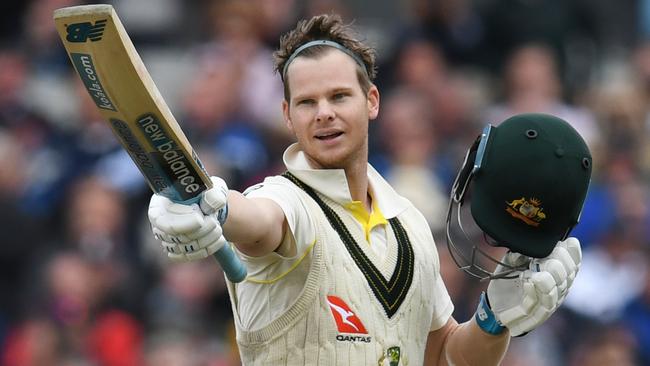Steve Smith is Australia’s rock but David Warner’s struggles continue
What would Australia do without Steve Smith, and what will they do about David Warner?

What would Australia do without Steve Smith, and what will Australia do if his contemporary David Warner continues in the same disappointing form?
Smith brought up his century before the lunch break yesterday, his third from four innings in the series, his 11th in Ashes matches, his sixth in England.
He has stared down the challenge from Jofra Archer and again fashioned the game into the shapes he desires. The best batsman in the world is causing a nightmare for the opposition and most of the mortals who have to bat with him. What everybody else finds so hard, he appears to find easy.
The only apparent change in Smith’s approach after the showdown with Jofra Archer at Lord’s was the presence of stem guards on the back of his helmet.
It is hard to remember anyone in such form and his returns stand in stark contrast to almost every other batsman in the series. Smith provides the bulk of Australia’s runs in England and until Marnus Labuschagne arrived nobody else was doing so in any significant manner.
In 2015, Chris Rogers and Warner chipped in to help, but both are absent in one way or another this time.
Smith returned from his one-year ban hungry for runs and appeared to return from his Lord’s concussion woes hungrier still. In the first instance it seemed he wanted to make up for lost time, in the second he wanted to swat aside the impression Jofra Archer or any manner of short bowling plans could render him vulnerable.
To see Archer removed from the attack after just a handful of deliveries to the Australian linchpin was disappointing. It is difficult to explain how the young bowler could not get himself up for the contest the cricket world had been craving since the second Test.
What made the move on the first day even more baffling is that England readily admit Smith is at his most vulnerable early on and know Archer is the first to find any apparent chink in his armour.
It took Smith three innings to return to the top of the ICC Test batting table, where he had sat for 141 games since moving there in 2015, occasionally sharing the billing with Joe Root and Virat Kohli. Only Gary Sobers and Viv Richards have dominated their peers for longer. Only Bradman had a higher rating.
England’s bowlers must be thoroughly sick of the sight of Smith at the crease. He has scored 50 or more in all of the past eight Ashes innings. He is averaging 146 in that time, with scores of 239, 76, 102no, 83, 144, 142 and 92 leading up to this match.
Most batsmen find English conditions difficult, but Smith’s average only drops from 64 to 61 when he plays in these parts.
Warner, however, is not having as good a time of it.
England does not suit the Australian opener. His predicament is a surprise on one level. He was one of the best batsmen in the World Cup and IPL tournaments leading into the Ashes, and unlike Smith he had not missed a beat since his ban. Not for Warner the introspection that saw Smith consider walking away from the game at his darkest point.
American singer-songwriter Bonnie Prince Billy notes in one of his many quirky songs that “for every field there’s a mole” and in Warner’s field that mole is Stuart Broad. The English bowler has burrowed the soil from beneath the opener’s feet this series, dismissing him five times in 87 deliveries. The strike bowler has found a place in his opponent’s head.
Warner’s numbers make for grim reading. He has just 79 runs at an average of 11 this series, and 61 of those came in the first innings at Headingley. That single half-century was scored in conditions as difficult as anybody has endured this summer, rain and light interruptions forcing the batsman to re-set on numerous occasions against a moving ball. It was a critical contribution to Australia’s total of 179.
That innings is proof that Warner is not irreparably undone.
Mike Hussey says Warner’s problems are more mental than technical and there is a confidence in Australian cricket that he will return to his best at home.
It would be good for the batsman and for selectors if he could arrange some indication of better things to come in what is left of the Ashes series.



To join the conversation, please log in. Don't have an account? Register
Join the conversation, you are commenting as Logout